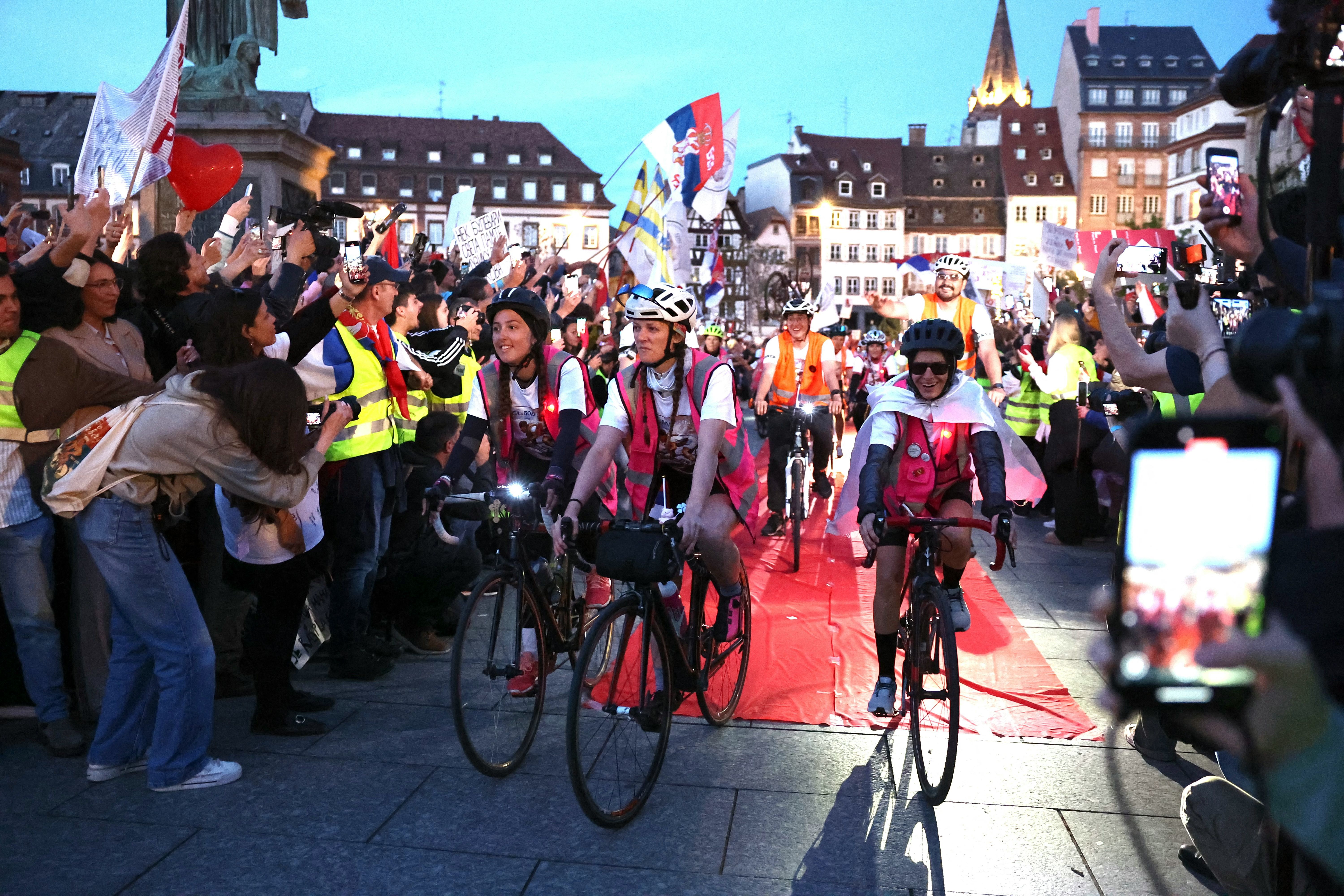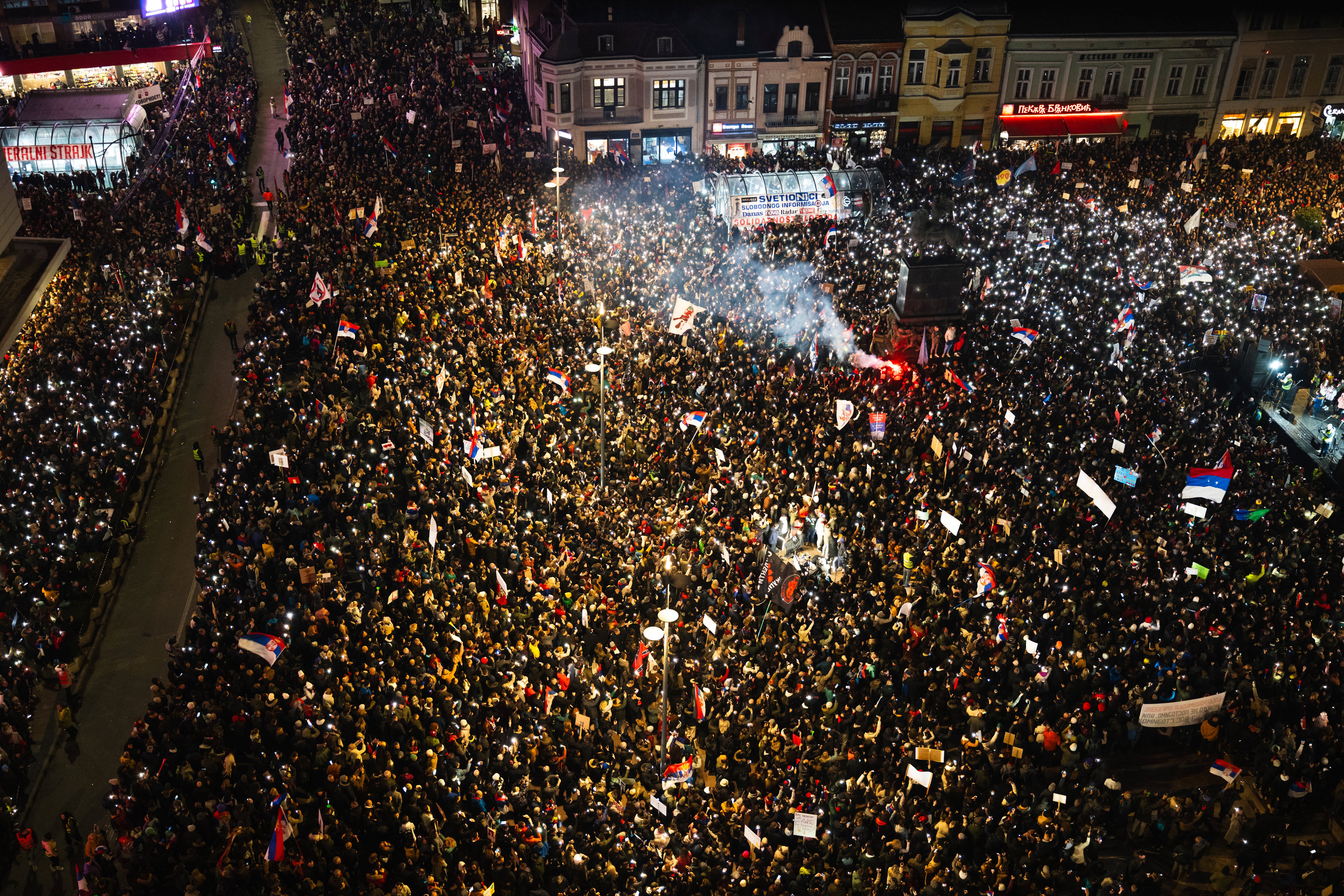From Novi Sad to Strasbourg: students call for reform in Serbia

After months of sustained demonstrations, 80 Serbian students completed a 13-day, 1,400-kilometre bicycle journey from Novi Sad to Strasbourg last week, arriving to meet with European lawmakers and draw attention to the crisis unfolding in their country. Their path led through Hungary, Slovakia, Austria and Germany, where they received warm welcomes from local citizens and members of the Serbian diaspora along the way. This trek was more than a symbolic act, it was a call for Europe to pay attention.
The students' list of demands reflects the broadening scope of the protests, which began in response to the deadly collapse of a train station canopy in Novi Sad last November. The incident, seen as emblematic of systemic corruption, ignited what has become one of Serbia's largest protest movements in decades. Now, students are demanding full transparency around the Chinese-led renovation of the station, accountability for those who attacked peaceful protestors (including students and professors) and justice for those arbitrarily detained. They are also calling for a 20 per cent increase in the budget for higher education.
Escalating repression and government response
“As the protests spread massively throughout the country from January to March, the level of repression also increased,” Marko Milosavljević, Head of Research and Advocacy at the Youth Initiative for Human Rights (YIHR) told Belga. “The behaviour of the authorities can be described as something between a dictatorship of spin and a classic dictatorship. Economic violence is widespread, with the government reducing the salaries of professors and teachers participating in the blockade in order to destroy the autonomy of the universities."
The response from Serbian president Aleksandar Vučić's government has been increasingly authoritarian. Protests have been met with police force, media smears and even suspected use of sonic weapons.
Controversy over alleged use of sonic weapons
On 15 March, one of the largest demonstrations in Serbian history saw as many an estimated 300,000 people flood the streets of Belgrade, eye witnesses say the number was even highee. The Interior Ministry put the figure at just over 100,000. What happened that night has drawn international concern: a loud sonic blast believed by many to have come from a Long Range Acoustic Device (LRAD) caused panic and injury.
“From 500 reports from citizens and their testimonies, it is clear that during the protest on 15 March, there was a strong sonic boom, which caused a series of physical and psychological reactions among those present,” six Serbian NGOs said in a joint statement.
"I was one of the people hit with the sound cannon on the 15th of March," one protestor, who asked to remain anonymous, told Belga. "I was scared that it would scare citizens away from next actions, but it ended up being the exact opposite. I spent 17 hours in the hospital after the attack and what came out of it was even more energy and motivation to not give up."

Public sentiment and EU accession
In recent weeks, students have ramped up pressure by blocking the entrances to the national broadcaster RTS in both Belgrade and Novi Sad, protesting what they call biased coverage of the events. Their frustrations go beyond the media. They are also demanding that the European Union take a firmer stance. While Serbia is officially a candidate for EU membership, its democratic backsliding has raised serious concerns. A recent NPSM poll from March 2025 showed that public opinion is now leaning against EU accession: 43.2 per cent would vote no in a referendum, while 38.9 per cent would vote yes.
Still, many see the students’ ride to Strasbourg and an upcoming planned trip to Brussels as a sign that a pro-European spirit remains strong among the country’s youth. “Evidence that citizens in Serbia see a European future is the bicycle tour of 80 students to Strasbourg and their reception in the European Parliament,” said Milosavljević. “The students participating in the blockade, who are demanding justice and fighting against violence, have not chosen Moscow, nor are they using reports from Putin’s secret service. Instead, they are calling on European citizens for solidarity and support in their fight against authoritarian regimes, such as those in Turkey or Georgia."
"I will call it the final battle against corruption"
Protesters are urging the EU to insist on basic democratic conditions before furthering accession talks, such as implementing ODIHR recommendations for fair elections, tackling systemic corruption, and protecting media freedoms. As one protestor put it, “Although the EU claims to uphold democracy and human rights as its core values, it remains somewhat silent about the current political situation in Serbia. As citizens, we would like to see more transparent support for our peaceful fight for democracy, freedom, and justice. Otherwise, the lack of support for the student movement and protests in Serbia will leave a bitter mark on Serbia’s youth—one that smells of hypocrisy.”
The protests have become a unifying force across generations and professions. "Whatever happens I will forever be happy for the connections we made, older people making us pie and soup and bringing it so we can eat, kids sending us messages of support, our parents being there for us even if it's scary, doctors, factory workers, teachers, professors, actors and singers, everyone doing their part in this, I will call it the final battle against corruption," the anonymous protestor concluded.
Approximately 80 Serbian students arrived in Strasbourg, the headquarters of several European institutions, on April 15, 2025, evening, at the end of a 1,400 km bicycle trip to denounce corruption in Serbia, which has been rocked by protests for months. © PHOTO FREDERICKP FLORIN / AFP